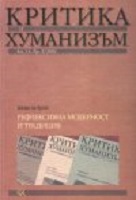Intencionalnost i vremevost vav fenomenologiata na Huserl
INTENTIONALITY AND TEMPORALITY IN HUSSERLIAN PHENOMENOLOGY
Author(s): Alexander SchnellSubject(s): Philosophy
Published by: Фондация за хуманитарни и социални изследвания - София
Summary/Abstract: The present study aims at presenting the fundamental stages of the Husserlian phenomenology of time. Such an analysis needs at first to clarify the method, which characterizes it in proper. The phenomenological method, far from simply depending on the psychological attitude of the philosophizing subject, consists in a specific attitude in view of the meaning of being of the object (phenomena), as well as of the subject himself. This attitude (that Hussserl names transcendental or phenomenological) allows having access to the properly phenomenological phenomena, which are not, as Heidegger thinks, ontological structures, but rather intentional and pre-intentional structures of the transcendental consciousness. Our study thematizes these structures in view of the problem of temporality, thus revealing the phenomena constitutive of the consciousness of time. This analysis consists of two stages: first of all, it describes the components belonging to the immanent sphere of consciousness (impressions, retentions, and protentions) before thematizing the phenomena constitutive of the latter. (cf. The Manuscripts of Bernau (Husserliana XXXIII)). On the basis of these phenomena it becomes possible to depict the “original process” (Urprozess) with its structure in nucleus - prolegomena to what we could identify as “phenomenology of nucleus”. Thus, it turns out that the Husserlian project inscribes itself in the critical perspective of Kant in so far as it reinforces the formal status of time. It, however, opens a new perspective, for this phenomenology of time leads to a radical disconnection between temporality and objectivity - a position which is radically opposed to what Kant had established in the chapter on the Analogies of experience in the Critique of Pure Reason, as well as to the usual comments on the Husserlian phenomenology of time which deal in an unilateral and simplifying way with the objectifying aspect of the intentional acts.
Journal: Критика и хуманизъм
- Issue Year: 2002
- Issue No: 14
- Page Range: 225-243
- Page Count: 19
- Language: Bulgarian
- Content File-PDF

